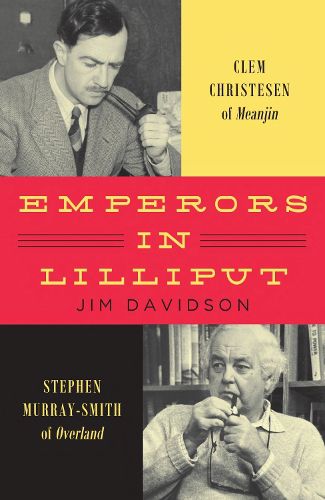Readings Newsletter
Become a Readings Member to make your shopping experience even easier.
Sign in or sign up for free!
You’re not far away from qualifying for FREE standard shipping within Australia
You’ve qualified for FREE standard shipping within Australia
The cart is loading…






Clem Christesen and Stephen Murray-Smith were giants of the world of Australian books and writing from the 1940s to 1980s.
‘Lilliput’, in this dual biography, is the world of literary magazines in Australia between the 1940s and the 1980s. Here Clem Christesen and Stephen Murray-Smith, of the journals Meanjin and Overland, were determined, driven visionaries. Both were very human - and occasionally bruised - believers in and workers for a better nation.
The book ranges from before the Menzies era and the Cold War, through the Whitlam period and beyond to the challenges of the 1980s. It shows how the editors constantly aimed for a culture more liberal, diverse and developed than the one then prevailing. Their publications may have lacked resources and economic return, but they nonetheless possessed authority, regularly providing stimulation for their readers and for the nation.
In finely wrought detail, Jim Davidson - the second editor of Meanjin - traces the commitment of Christesen and Murray-Smith to this ambitious cultural project and how it attracted many of the key writers and thinkers of those years. There are pen portraits of many of them, as the reader is taken behind the scenes. Emperors in Lilliput exhibits the enlightened creative spirit animating these journals at their best. It is at once captivating biography and rich social history.
$9.00 standard shipping within Australia
FREE standard shipping within Australia for orders over $100.00
Express & International shipping calculated at checkout
Clem Christesen and Stephen Murray-Smith were giants of the world of Australian books and writing from the 1940s to 1980s.
‘Lilliput’, in this dual biography, is the world of literary magazines in Australia between the 1940s and the 1980s. Here Clem Christesen and Stephen Murray-Smith, of the journals Meanjin and Overland, were determined, driven visionaries. Both were very human - and occasionally bruised - believers in and workers for a better nation.
The book ranges from before the Menzies era and the Cold War, through the Whitlam period and beyond to the challenges of the 1980s. It shows how the editors constantly aimed for a culture more liberal, diverse and developed than the one then prevailing. Their publications may have lacked resources and economic return, but they nonetheless possessed authority, regularly providing stimulation for their readers and for the nation.
In finely wrought detail, Jim Davidson - the second editor of Meanjin - traces the commitment of Christesen and Murray-Smith to this ambitious cultural project and how it attracted many of the key writers and thinkers of those years. There are pen portraits of many of them, as the reader is taken behind the scenes. Emperors in Lilliput exhibits the enlightened creative spirit animating these journals at their best. It is at once captivating biography and rich social history.
This gorgeously titled book delivers the Heroic Age epic of little magazine publishing inAustralia, ‘little magazines’ being a way to describe literary/cultural periodicalsinspired by the avant-garde Chicago journal, The Little Review. Jim Davidson tracks the decades-spanning careers of the two editors who established two crucial Australian little magazines, Meanjin and Overland. Along the way, Davidson’s eyewitness account (literally: he took over the reins of Meanjin himself in 1975) rewards the fascinated reader with a detailed picture of Australian literary culture through the lenses of two crusading, larger-than-life founding editors: Clem Christesen and Stephen Murray-Smith.
Both these Melbourne-based magazines were born elsewhere: Clem begins Meanjin in Brisbane in 1940, Stephen’s Overland grows out of The Realist Writer in 1954. Davidson spends his time tacking between these two men and marking the times that their paths cross, which is often, and the occasions on which they are cross, which is also often, particularly Clem. Davidson excels at giving us an up-close, no-holds-barred account of the encouragement, generosity, literary spats, visionary pig-headedness and white- knuckle doggedness that was involved in getting these magazines up and running(no small task in itself) as well as keeping them going through their early decades (a more Sisyphean effort). Desperate financial insecurity, constant cap-in-handing, dealing with the egotism of writers and politicians and academics … gad. It’s a heartbreaker.
Although Clem and Stephen are absolutely the central figures in this cultural history, they are generously contextualised by tales of the family members, friends and enemies who enabled their monumental contributions to the conversation that is Australian cultural life. Davidson has given us a spectacular warts-and-all twin portrait of these two shepherds (perhaps sheep dogs) of Australian literature from the 1940s up to the 1980s. Given the continuing existence today of the little magazines that they created, their legacy continues into the 21st century. Huzzah!
See what the Readings’ team have to say on the blog, discover related events and podcast episodes.
Our top picks of the latest bargain books, available now at Readings.
Insightful biography, memoir, essays and analysis at great bargain prices.